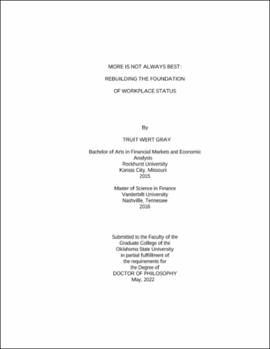| dc.contributor.advisor | Schurer Lambert, Lisa | |
| dc.contributor.author | Gray, Truit Wert | |
| dc.date.accessioned | 2023-03-23T20:30:20Z | |
| dc.date.available | 2023-03-23T20:30:20Z | |
| dc.date.issued | 2022-05 | |
| dc.identifier.uri | https://hdl.handle.net/11244/337165 | |
| dc.description.abstract | In this dissertation I address the assumption within workplace status research that more status is beneficial. I suggest that it is not more status that is best, but the right amount of status. Using a person-environment (P-E fit) perspective, I argue that the joint effect of needed and received status may impact workplace outcomes, and without considering both needed and received, we may have an incomplete view of the effects of workplace status. Specifically, I suggest that having more status than desired may be detrimental. | |
| dc.description.abstract | Prior to examining workplace status using a P-E fit perspective, I address a threat to knowledge accumulation. Workplace status is currently defined and measured using related concepts, thus clouding the distinctiveness of status. Additionally, as the concepts used to define workplace status shift study to study, the content domain of status shifts, limiting knowledge accumulation. I clarify the definition of workplace status using an interview study and prior literature. I then use this definition to develop a measure of workplace status that does not rely on others constructs. I conduct a subject matter expert review, a working adults review, and an assessment of the measurement model and nomological net to support the resulting five-item workplace status measure. This new definition and measure should allow for reduced definitional and measurement inconsistency and thus more streamlined knowledge accumulation. | |
| dc.description.abstract | Using this measure, I test and support my idea that the joint effect of needed and received workplace status impacts relevant outcomes. Specifically, while having less status than desired (deficiency) is detrimental to outcomes such as job satisfaction, have more status than desired (excess) is also detrimental. My results suggest that the assumption that more workplace status is best may be unfounded. By incorporating a P-E fit perspective I demonstrate that the effect of status varies depending on the joint effect of needed and received status, giving us a more complete picture of the effects of status at work. | |
| dc.format | application/pdf | |
| dc.language | en_US | |
| dc.rights | Copyright is held by the author who has granted the Oklahoma State University Library the non-exclusive right to share this material in its institutional repository. Contact Digital Library Services at lib-dls@okstate.edu or 405-744-9161 for the permission policy on the use, reproduction or distribution of this material. | |
| dc.title | More is not always best: Rebuilding the foundation of workplace status | |
| dc.contributor.committeeMember | Dimotakis, Nikos | |
| dc.contributor.committeeMember | Greco, Lindsey | |
| dc.contributor.committeeMember | Grant, DeMond | |
| osu.filename | Gray_okstate_0664D_17593.pdf | |
| osu.accesstype | Open Access | |
| dc.type.genre | Dissertation | |
| dc.type.material | Text | |
| thesis.degree.discipline | Business Administration | |
| thesis.degree.grantor | Oklahoma State University | |
